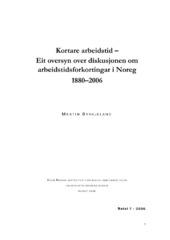| dc.contributor.author | Byrkjeland, Martin | eng |
| dc.date.accessioned | 2006-10-11T11:36:14Z | |
| dc.date.accessioned | 2020-12-10T06:31:37Z | |
| dc.date.available | 2006-10-11T11:36:14Z | |
| dc.date.available | 2020-12-10T06:31:37Z | |
| dc.date.issued | 2006-08 | eng |
| dc.identifier.issn | 1503-0946 | |
| dc.identifier.uri | https://hdl.handle.net/1956/1894 | |
| dc.description.abstract | The report presents an overview of the process of reducing working time in Norway from the 1880-ies until today. Before 1920 this was mainly a process that reduced the the length of the working day and introduced Sunday as a general holiday. Adherents saw this as a fundamental human right. Opponents feared economic consequences but were also opposed to an encroachment on individual freedom. This development culminated when the 8-hour working day was established by law in 1919. Between 1920 and 1975 working time was shortened in two ways: Holiday became a general right that was established by law in 1936. The length of the working week became gradually shorter, but this did not lead to a shorter working day. Instead the reduction resulted in increasingly longer weekends. The two-day weekend became normal for most people during the 1960-ies. The general right to leisure time was undisputed in this period. But possible negative economic consequences slowed down the working time reduction. Since 1975 demand for shorter working time has been interweaved with a demand for flexible working time arrangements. Shorter working hours is wanted mainly because of the pressed timetable in the two-income family. Later years the large amount of people outside working life has also become an argument. There are a number of causes for wanting more flexible working hours. Among those, the need for extended production time and the increasingly longer opening hours in service industries may be the most important. The discussion the last thirty years has had insignificant effects on law regulation. The most important event, the introduction of the 37,5 hour week in 1986, was a result of the collective bargaining process. | en_US |
| dc.description.abstract | Notatet presenterer dei sentrale argumenta for og i mot ei regulering av arbeidstida i Noreg frå 1880-åra til i dag og dei viktigaste hendingane i denne prosessen. Fram til 1920 handla det i første rekkje om å få til kortare arbeidsdag og sundagsfri. Dette blei sett som ein menneskerett av tilhengarane, medan motstandarane dels frykta dei økonomiske konskvensane, dels såg det som eit inngrep i individets rett til å bestemme over seg sjølv. Denne utviklinga kulminerer med at åttetimarsdagen blir lovfastsett i 1919. Mellom 1920 og 1975 blei arbeidstida kortare på to måtar: For det første blei ferie eit allment gode vedteken ved lov i 1936. For det andre blei arbeidsveka stegvis kortare. Det siste førte likevel ikkje til kortare arbeidsdag, fordi nedkortinga blei teken ut som stadig lengre helgefri, der fri både laurdag og sundag blei det vanlege frå slutten av 1960-åra. Etter 1920 var retten til å ha fritid blitt udiskutabel. Det var uroa over dei moglege negative makroøkonomiske konsekvensane som gjorde at nedkortinga skjedde i små seg og i eit sakte tempo. Etter 1975 var diskusjonen om kortare arbeidstid samanvevd med ein diskusjon om å innføre arbeidstidsordningar som fråveik normalarbeidstida, oftast karakterisert som fleksibel arbeidstid. Ønsket om kortare arbeidstid blei i første rekkje grunngjeve med tidsklemma i to-inntektsfamilien. Dei siste åra har òg den store utstøytingsgraden i arbeidslivet blitt nytta som argument. Ønsket om fleksible arbeidstidsordningar har eitt breitt spekter av årsaker, der behov for auka driftstid i verksemdene og dei forlenga opningstidene i varehandelen er blant dei viktigaste. Trass i mykje debatt har det skjedd lite med lovreguleringa av arbeidstida etter 1975. Viktigaste endringa, innføringa av 37,5 timars veka, skjedde i eit tariffoppgjer. | no |
| dc.format.extent | 592958 bytes | eng |
| dc.format.mimetype | application/pdf | eng |
| dc.language.iso | nno | eng |
| dc.publisher | Stein Rokkan Centre for Social Studies | eng |
| dc.relation.ispartofseries | 7-2006 | |
| dc.relation.ispartofseries | Notat | no |
| dc.title | Kortare arbeidstid - Eit oversyn over diskusjonen om arbeidstidsforkortingar i Noreg 1880-2006 | nob |
| dc.type | Working paper | eng |
| dc.subject.nsi | VDP::Samfunnsvitenskap: 200 | nob |
